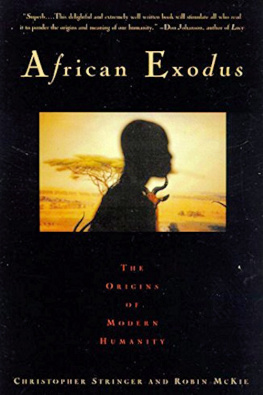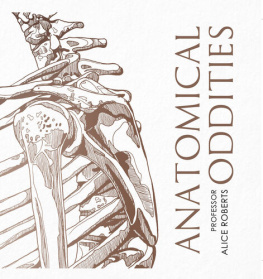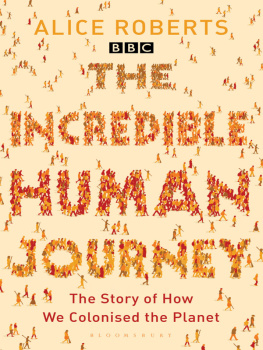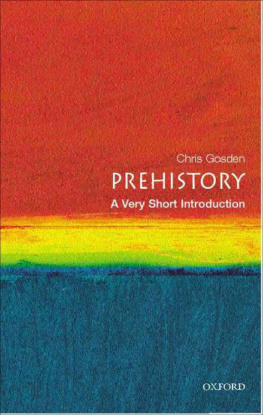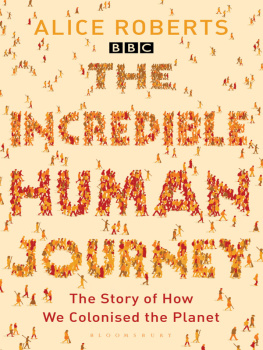PENGUIN BOOKS
HOMO BRITANNICUS
Chris Stringer works at the Natural History Museum in London, where he leads the Department of Palaeontologys research into human origins. He also currently directs the Ancient Human Occupation of Britain project, a collaboration of scientists and experts around the country, aimed at reconstructing the first detailed history of how and when Britain was occupied by early humans. His previous books include African Exodus: The Origins of Modern Humanity and The Complete World of Human Evolution.
CHRIS STRINGER
Homo britannicus
The Incredible Story of Human Life in Britain

PENGUIN BOOKS
To Katy, Paul and Tom, the latest generation of
Homo britannicus
PENGUIN BOOKS
Published by the Penguin Group
Penguin Books Ltd, 80 Strand, London WC2R 0RL, England
Penguin Group (USA) Inc., 375 Hudson Street, New York, New York 10014, USA
Penguin Group (Canada), 90 Eglinton Avenue East, Suite 700, Toronto, Ontario, Canada M4P 2Y3
(a division of Pearson Penguin Canada Inc.)
Penguin Ireland, 25 St Stephens Green, Dublin 2, Ireland (a division of Penguin Books Ltd)
Penguin Group (Australia), 250 Camberwell Road, Camberwell, Victoria 3124, Australia
(a division of Pearson Australia Group Pty Ltd)
Penguin Books India Pvt Ltd, 11 Community Centre, Panchsheel Park, New Delhi 110 017, India
Penguin Group (NZ), 67 Apollo Drive, Rosedale, North Shore 0632, New Zealand
(a division of Pearson New Zealand Ltd)
Penguin Books (South Africa) (Pty) Ltd, 24 Sturdee Avenue, Rosebank, Johannesburg 2196, South Africa
Penguin Books Ltd, Registered Offices: 80 Strand, London WC2R 0RL, England
www.penguin.com
First published 2006
1
Copyright Chris Stringer, 2006
The moral right of the author has been asserted
All rights reserved
Without limiting the rights under copyright reserved above,
no part of this publication may be reproduced, stored in or
introduced into a retrieval system, or transmitted, in any form
or by any means (electronic, mechanical, photocopying, recording
or otherwise), without the prior written permission of both the
copyright owner and the above publisher of this book
Designed by Andrew Barker
EISBN: 9780141902364
Contents
It had been a long, dry summer and the huge river had shrunk to a single deep channel, its many meanders now forming isolated water holes and reed beds. The land around the river estuary sloped gently down to a coast as it curved eastwards in a sweeping bay for a hundred miles, the sun shimmering brightly on the calm sea. A solitary man, naked and powerfully built, perched amongst the reddening leaves of a maple tree. He glanced briefly up to the sky, looking for the clouds that might at last promise that autumn rains were on their way to cool the parched landscape. But his most intense gaze was on the grassy riverbank below, where the women and children were hacking with small stone tools at the carcass of a baby hippo. They had smashed the skull open and were pulling out the brain, which was still warm and moist to their fingers and lips. His brothers and the older children had driven the hyaenas away, and the rest of the hippos, including the mother of this baby, had moved into deeper water. The man had eaten his fill already, but he kept his guard up there were lions and wolves not far away, not to mention elephants, to judge from the sounds of splintering wood coming from the trees behind him.
This is not some scene from our ancestral African homelands of two million years ago, nor even from southern Europe a million years ago, although there are similarities in the animals and the climate. This is Suffolk, about 700,000 years before the recent emergence of evidence from sea cliffs near Lowestoft provided such a vivid picture of the landscape inhabited by the first Britons.
Prologue: The Mystery of the First Britons
The ancient history of Britain seems to be all around us today. Newspapers, magazines, television documentaries and websites vie for our attention with stories of Vikings, Saxons, Romans and older tribes, stretching back to the Neanderthals of the last Ice Age. But away from homes and high streets, secrets of Britains ancient history still lie waiting to be prised from under our feet, as we walk across roads, along cliff paths, on beaches and in quarries and caves. This book is about an entirely new prehistory of Britain being pieced together from the hidden evidence teased from layers of soil and rock accumulated through many millennia.
Homo britannicus presents the work of the Ancient Human Occupation of Britain project (AHOB). This project has brought together thirty archaeologists, palaeontologists, geographers and geologists at Institutes across the country in a unique collaborative network to reconstruct the most detailed calendar of human presence and absence in Britain yet achieved, using the latest techniques of scientific investigation. Although human fossils are very rare in Britain, evidence of human occupation is scattered over the landscape, preserved in ancient river deposits, and stored up in caves, in the form of stone tools and animal bones. Fossil remains can tell us what people looked like, stone tools can reveal details of their behaviour and adaptations, while associated sediments and animal remains can be analysed to unlock the secrets of ancient climates and environments. During the course of the project, many of the mysteries and uncertainties in our early history have been resolved. By showing the vulnerability of humans to past climate and environmental changes, AHOB is also providing a warning for the future, for the human race will face challenges every bit as serious in the near future.
Britain seems a verdant and timeless land for its inhabitants today, and we know from artefacts and fossils that our Stone Age predecessors lived here many hundreds of thousands of years ago. We might think, therefore, that the roots of the British people lie deep in British soil. Astonishingly, we now know they can be traced back less than 12,000 years, roots far more shallow than those of our neighbours on the Continent. The native peoples of America, Australia and Japan can all claim to have lived longer in their own lands than the British in theirs. Before 11,500 years ago, Britain was subject to some of the most rapid and violent swings in climate and environment in the entire history of the Earth. So vicious and challenging were these changes that time and time again people could only ever establish a temporary foothold here before being completely swept away, and Britain had to be recolonized about every 100,000 years. We have evidence that between 500,000 and 12,000 years ago humans were only here at all for about 20 per cent of the time; between 180,000 and 70,000 years ago, Britain was abandoned, completely empty of people for over 100,000 years.
For most of the last one million years, Britain was not an island. There would have been a wide land bridge to the European continent, so we cannot study the British record in isolation. The plants, animals and humans that we find in Britain during the ice ages, and the warm periods between, came via western Europe. The rich ice age records of neighbouring countries can thus provide us with valuable data on the sources for migrating populations, and the refuges to which early British inhabitants might have fled during the bad times.
AHOB is investigating a series of key questions about the first Britons, and this book looks at those questions, who is addressing them (see the . An ancient buried landscape in East Anglia is being re-exposed and reconstructed to reveal a human presence that goes back a staggering 700,000 years the oldest definite evidence of humans in northern Europe. These early inhabitants belonged to a primitive species whose only tools were shaped stones. At this time Britain was a peninsula of western Europe, when the now-vanished Bytham River flowed eastwards across East Anglia to a vast delta, draining into a northern sea where its waters joined those of the ancient Rhine.


